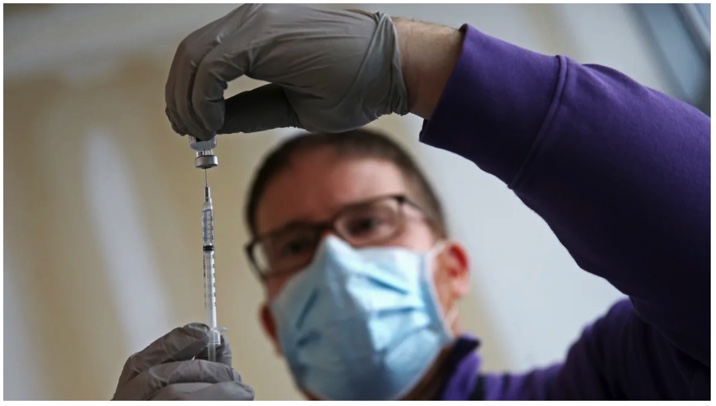With more than one-third of Americans saying they’re unlikely to take the COVID-19 vaccine shots, these behavioral scientists lay out some creative and proven ways to change minds.

Kristopher Young, PHARMD loads a needle with COVID-19 vaccine at the South Shore Hospital on December 17, 2020 in Weymouth, Massachusetts. [Photo: Matt Stone/ MediaNews Group/Boston Herald)
Last week, 37% of Americans polled said they’re not going to take the FDA-approved COVID-19 vaccines. This is a problem. If more than 1 in 3 people didn’t take the vaccine, it would not only make everyone less safe, but it would significantly delay the reopening of elements of the economy. Suffering would be extended, and lives would be lost.
While it’s fantastic that many of the nation’s leading scientists are involved in vaccine creation and rollout, there’s someone else that should be in the room when the new administration is determining how to actually get this vaccine into the population as quickly as possible: behavioral scientists.
This is because, as experts in decision-making, we behavioral scientists know what actually drives adoption, and we see plenty of reason to worry when it comes to this vaccine. Not only will we be up against a war of misinformation, but both the Pfizer and Moderna vaccines require people to take two doses—that means they’d need to make the choice to take an action twice, which increases the level of complexity.
THE AGGRESSIVE BUT SUREFIRE WAY
According to reports, the US approach will likely rely on a technology system that tracks people’s doses, along with a physical card for people to carry in their wallets. If implemented successfully, this system creates an opening to build incentives to participate in society: if you want to do X, you need proof of vaccine.
The U.S. has achieved roughly 94% coverage of its citizens for measles, mumps, rubella and more by using a similar incentive system, linking societal activities (like going to school) with vaccinations. Sure you can skip the vaccine, but you give up free public education by doing so.
The most sure-fire path back to normal would be to require a “Vaccine Pass” to do adult activities such as concerts, flights and yes, even employment. Importantly, this is not a mandate—no one is forcing anyone to get a vaccine—but it would require people to forego societal benefits if they chose not to vaccinate.
NEXT BEST OPTIONS, LESS AGGRESSIVE
Operationalizing a Vaccine Pass system is hard, will take time, and will certainly meet resistance. Alternatively, we can help people make better decisions today by using what we know about human behavior. Here are five ideas, based on psychological insights, that we can do right now.
1. SCHEDULE VACCINATION APPOINTMENTS
Evidence shows that it’s hard to get people to both schedule appointments and then show up. This is particularly worrisome because the vaccine will require two doses (read: two appointments). One easy hack is to just schedule the appointment for them. Insurance companies, pharmacies or state health departments are optimally positioned to do this. Giving people a time/date/location has boosted flu shots by 36%. And an effective way to get people to show up is to ask them to “make a plan.” Asking people to write down how they will get to an appointment has increased flu shots by 8%
2. INCLUDE A LOTTERY TICKET
In 1950, Taiwan increased sales tax collection by 75% when they put a set of lottery numbers on the sales receipt. Customers demanded their receipt for fear of missing out on the winning ticket. Countries around the world have since followed suit with similarly positive results.
Money talks. Include a lottery code that is paid out each week on vaccination cards. This type of reward substitution (getting us to do the right thing for the wrong reason) could help move the needle for those 37% of people.
3. PUBLICIZE YOUR VACCINE STATUS
Social norms are a powerful motivator. Experiments conducted in Iowa proved that the threat of publishing the names of non-voters in the local newspaper drove higher turnout. Norms can also work to drive vaccinations. Imagine you could see if your Uber driver or babysitter was vaccinated—or if you could choose a restaurant based on whether their staff was vaccinated. There could be a universal symbol to show that a person or an establishment has been vaccinated. This visible mark (reminiscent of the scar people got from a small-pox vaccination) could be a strong motivator to vaccinate.
4. CHOOSE WORDS CAREFULLY
Some people react poorly when told what to do if they think it restricts their freedoms (the formal word for this is “reactance”). Research shows one way to successfully counter reactance is to instead focus on the possible positive outcomes vs. negative ones. Reframing vaccinations as helping Americans gain their freedom, and getting vaccinated quickly as a source of American pride, is important.
5. ADD A DEADLINE
Evidence shows we’re a nation of procrastinators. The perception that we can always get the vaccine “tomorrow” will lead to low adoption. To avoid this, we can create a deadline. We may file our taxes on April 13th or sign up for health care the day before enrollment ends, but we do it because there’s a deadline. A 30-day deadline with consequences such as having to wait in line, pay a small fine, or lose your spot altogether will drive uptake.
The stakes are high, and several of these ideas are low-cost but high-return. Some could be added to states’ existing rollout plans fairly easily. Of course, all would need to be carefully thought through to make sure they’re appropriate and not punitive for the communities we need to reach.
Want to explore practical ways to apply behavioral science? Check out our Behavioral Design for Health course.